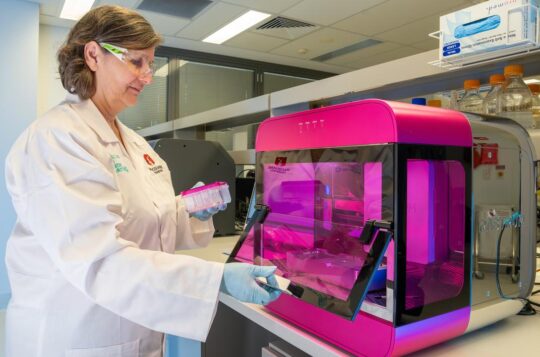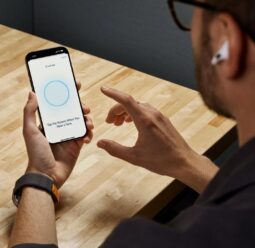
AI and 3D technology weaponised in fight against cancer
Medical researchers will use cutting-edge technology to 'print' cancer cells and test treatments on them rather than patients following a $2 million grant.

Medical researchers will use cutting-edge technology to 'print' cancer cells and test treatments on them rather than patients following a $2 million grant.
More than 30,000 Australians are young cancer survivors but little is known about how the disease affects patients later in life.

More consumer technology is being approved for medical use in Australia, from earbuds that work as hearing aids to smartwatches that test for heart problems.

Changing tax incentives, creating a spending target, and helping businesses work with researchers could help Australia make breakthroughs the world needs.
Five Indigenous scholars have been awarded the inaugural First Nations Cancer Scholarship, supporting each person to undertake full-time studies or research.

Australian businesses and governments are investing too little in vital research projects, a discussion paper has revealed.
A shocking rise in blood cancer cases has prompted calls for more prevention and early detection research, with the disease killing 16 Australians every day.
Hoping to reduce high rates of dementia among Torres Strait Islanders, a team of researchers is developing a pilot program for people at risk of the disease.

Health sensors could track even more vital signs from your skin in future, including your blood sugar levels and vegetable intake.
Tens of thousands of Australians helped contribute to the world's largest study into depression genetics, generating hope for more tailored treatments.
A groundbreaking competitive swimming program designed for young people with severe cerebral palsy is reversing the motor decline associated with the condition.
Refugee mothers suffer pregnancy issues compared to Australian-born women but a specialist midwifery service is easing labour pains and giving peace of mind.
A previously unknown gene variant unique to the Oceanic region could help improve disease prevention for Indigenous people, researchers say.
People with metastatic breast cancer often feel invisible but world-leading research to understand its prevalence could mean better support.

Would you trust a ring to track your sleep? It is a question more Australians may ask this Christmas as smart jewellery vies for attention.
One in three parents are worried about their teens gambling, with children aged under 10 among those treated for related health problems.

A review of more than 5000 studies for the World Health Organisation has sought a definitive answer on whether mobile phones are safe to use.

Australia doctors are increasingly using AI tools in their clinics but medical groups insist patients will not be diagnosed by technology.

Could hearing aids and cochlear implants benefit from artificial intelligence technology? Google and Australian researchers have teamed to find out.
Babies with peanut allergies in Australia will be offered a treatment program under a world-first model aiming to transform allergy care.
An undiagnosed infected wisdom tooth that nearly killed a young woman when it deteriorated into severe sepsis, has sparked a medical breakthrough.
Researchers have received $4 million to work on a treatment they hope will slow or stop Parkinson's disease by targeting gut health.
A drug that has been on the market to treat opioid addiction can potentially be used to alleviate debilitating illnesses like long COVID, researchers say.
Poor sleep affects up to 90 per cent of people who suffer from chronic pain, but health practitioners rarely considered it a central part of their treatment.
Researchers are collecting ticks from Australian farms in a bid to unlock information on the deadly parasites and develop a vaccine for animals and humans.
Queensland rugby league legend Wally Lewis has opened up on his battle with brain injury CTE, in a call for funding and more research into the disease.

Fitness gadgets that track your vital signs could be powered by sweat in the future after a research into nanogenerators by Australian universities.
The lives of almost 18,000 people aged over 50 were saved by COVID-19 vaccines in one state alone as the Omicron strain hit, a study has found.
A new drug is undergoing trials in hospitals across Australia with hopes it will be used by first responders to slow brain injury during the onset of a stroke.
A Queensland study has found the genetic secret behind the likelihood of women producing twins or having lower fertility.
Mums who do not eat cooked fish or eggs during pregnancy have a higher risk of having kids with childhood obesity, a new study says.